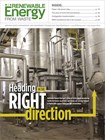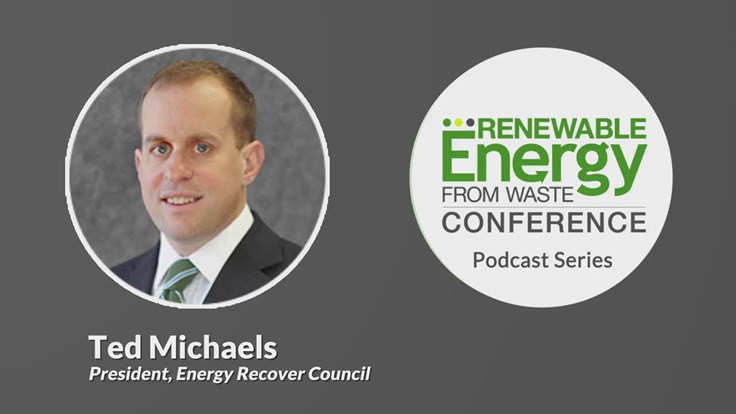Penobscot Energy Recovery Co. (PERC), Orrington, Maine, and its majority owner and managing general partner, USA Energy Group, along with Exeter Agri-Energy (EAE), have filed an appeal in the Kennebec County (Maine) Superior Court seeking to reverse the Maine Department of Environmental Protection (MDEP) issuing a solid waste and air emission license to Fiberight and Municipal Review Committee (MRC), a nonprofit group representing the solid waste interests of nearly 187 Maine communities and solid waste districts, which was needed in order to move ahead on construction of the waste-to-energy facility.
PERC is a waste-to-energy firm serving communities throughout much of Maine. The facility converts municipal waste into renewable electricity.
EAE is a subsidiary of Stonyvale Farm, a dairy family farm in Exeter, Maine. The company collects manure from the farm, along with food waste collected from stores, restaurant and institutions throughout New England. It processes the waste at its two anaerobic digesters, converting the material into biogas to run electrical generators as well as liquid fertilizer for the farm’s fields and bedding for the cows.
Fiberight, based in Maryland, and MRC received approval for the permits on July 14th to build a $70 million project in Hampden, Maine, that will be capable of converting solid waste into a renewable energy product. The facility is slated to come on line by April 2018. The company is presently in the financing stage for the project. Covanta will be the operator of the plant.
According to Craig Stuart-Paul, founder and CEO of Fiberight, when operational the facility will be taking in around 140,000 tons of solid waste per year, converting a large amount of it into digester gas.
In filing the appeal, the two companies state that the project received the permits “despite serious deficiencies in the record and in contravention of existing statutory and regulatory requirements.”
“The same standard should apply to all applicants to submit complete information at the time of filing, and the MDEP should take whatever time is necessary to ensure that all environmental concerns are addressed,” says Robert Knudsen, vice president of USA Energy. “The MDEP made its decision without the benefit of a public hearing and relied too heavily on inconsistent and incomplete information from the applicants. Maine people who care about the environment should be deeply concerned, as should those communities that have committed to send their trash to Fiberight after 2018.”
In addition to rejecting multiple requests for public hearings on the permit applications, Knudsen continues, the MDEP should have held MRC and Fiberight accountable for more complete information, and should not have overlooked serious concerns expressed by seven members of the legislature’s Energy and Natural Resources Committee about the project’s compliance with Maine’s solid waste management hierarchy.
He also notes that the U.S. EPA has gotten involved in the matter by requesting significant data from Fiberight, which the company says it won’t be able to provide for another one and a-half to two months. “At the very least, MDEP should not have issued licenses until the EPA’s questions were fully addressed,” Knudsen notes.
“It is important for our companies and other regulated companies in Maine to have an even playing field, and we are confident that the court will agree,” says Adam Wintle, managing partner for EAE. “The only thing more difficult for a business than too much regulation is inconsistent regulation.
“All of us who take our environmental responsibilities seriously should be concerned that these licenses were granted based on the information provided,” Wintle adds.
The appeal, filed in Kennebec County Superior Court, cites several grounds for appealing the MDEP approvals, including:
- MRC/Fiberight failed to demonstrate that its practices and impacts will be consistent with Maine’s solid waste hierarchy;
- MRC/Fiberight failed to demonstrate title, right and interest in the project property;
- MRC/Fiberight failed to demonstrate the technical ability to perform the project;
- MRC/Fiberight failed to demonstrate the financial ability to perform the project;
- The MDEP approval of the licenses was arbitrary, capricious and an abuse of discretion given the contradictory and conflicting nature of the assertions in the applications;
- There was insufficient evidence in the record to support approval of the minor source air emission license; and
- Under the circumstances of this case, the MDEP should have held a public hearing on the MRC/Fiberight licenses.
“This is one of the most important environmental cases in Maine in many years,” says Doyle & Nelson partner Jon Doyle, who filed the appeal on behalf of PERC and EAE. “It involves the disposition of thousands of tons of trash, how it will be treated, where it will go and whether the Fiberight plan violates recent Maine law establishing the state’s solid waste management hierarchy. It also speaks to the responsibility of applicants to provide complete and accurate data.”
The appeal was filed under Rule 80C of the Maine Rules of Civil Procedure. The MDEP is now required to file a record in the case and legal briefs will follow within 40 days of that. To view the appeal, click on the following link.
Fiberight’s Stuart-Paul points out that the appeal has come from two competitors to the project. And, he continues, a majority of the communities signed up with Fiberight, rather than stay with EAE or PERC.
Stuart-Paul also questions why the two companies filed an appeal with the Superior Court, rather than with the state DEP, a more natural course of action for those opposed to a permit.
“The appeal is groundless,” he notes. “It is business as usual,” Stuart-Paul stresses.
To view the appeal, click here.



